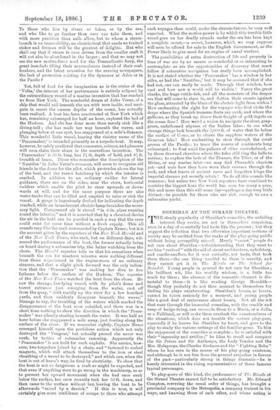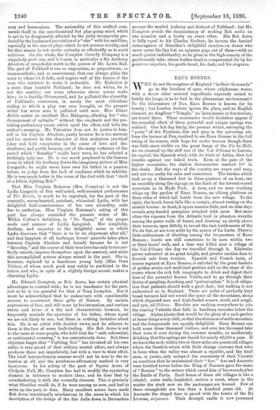SHERIDAN AT THE STRAND THEATRE.
THE steady popularity of Sheridan's comedies, the unfailing interest they excite, are not in themselves surprising, even in a day of essentially bad taste like the present ; but they suggest the reflection that two otherwise important sections of society may be omitted from the ranks of the play-going public without being perceptibly missed. Merely " smart " people do not care about Sheridan—notwithstanding that they went to see him "revived" with the aid of street architecture, upholstery, and candle-snuffers, for it was curiosity, not taste, that took. them there—the one thing needful to them is novelty, and they cannot get it in The Rivals or The School for Scandal. Young people in general do not care for Sheridan ; his brilliant wit, like his worldly wisdom, is a little too much for them ; the absence of the romantic element is dis- tasteful to them—it is like reading George Meredith— though they probably do not thus account to themselves for finding his plays uninteresting. Sheridan's lovers, as lovers, cannot be taken seriously for a moment, and young people like a good deal of seriousness about lovers. Not all the wit that runs through the immortal comedies, with the crackle and snap of hedge-firing, can reconcile them to a Maria, or a Julia, or a Falkland, or will make them overlook the unnaturalness of the situations, which does not trouble the mature play-goer, especially if he knows his Sheridan by heart, and goes to the play to study the various settings of the familiar gems. To him the enjoyment of the comedies is complete ; he is satisfied with their "ingenuity and artifice ;" he likes to recall and compare the Sir Peters and Sir Anthonys, the Lady Teazles and the Mrs. Malaprops, the Charles Surfaces and the "Fighting Bobs" whom he has seen in the course of his play-going existence, and although he is not free from the general prejudice in favour of the past—particularly strong in things dramatic—he is keenly interested in the rising representatives of those famous typical personages.
To play-goers of this kind, the performance of The Rivals at the Strand Theatre cannot fail to he satisfactory. Mr. Edward Compton, reversing the usual order of things, has brought a provincial company to the Metropolis, a company trained in his ways, and knowing those of each other, and whose acting is
easy and harmonious. The rationality of this method com- mends itself to the non-theatrical but play-going mind, which is apt to be disagreeably affected by the jerky incongruity pro- duced by the haphazard association of a "star" with his satellites, especially in the case of plays which do not possess novelty, and for that reason do not excite curiosity so effectually as to avert criticism. On the whole, the Compton Comedy Company is a singularly good one, and it boasts in particular a Sir Anthony Absolute of remarkable merit in the person of Mr. Lewis Ball. The part of Falkland is one so ungracious, so preposterous, so unsympathetic, and so unnecessary, that one always pities the actor to whose lot it falls, and augurs well of the future of the man who contrives to make it endurable. Mr. Blakiston is a more than bearable Falkland; he does not whine, he is not the snarling car some otherwise clever actors make him; he is frankly' ill-tempered, and he palliated the absurdity of Falkland's conversion, in surely the most ridiculous ending to which a play was ever brought, as the present writer has never seen it palliated until now. Miss Elinor Aickin makes an excellent Mrs. Malaprop, effecting her "nice derangement of epitaphs" without the emphasis and the pro- voking preliminary pause which spoil the effect, and belie the author's meaning. Mr. Valentine does not do justice to him- self in his Captain Absolute, partly because he is too nervous and too anxious in the character of that audacious practical joker and bold conspirator in the cause of love and dis- obedience, and partly because, out of the many costumes of the period which "Beverley" might have worn, he has selected a strikingly ugly one. He is too much perplexed in the famous scene in which Sir Anthony draws the imaginary picture of Miss Languish ; he might never have seen his father in a passion before, to judge from the lack of readiness which he exhibits. He is very much better in the scene of the duel with that "devil of a fellow, fighting Bob."
That Miss Virginia Bateman (Mrs. Campton) is not the Lydia Languish of this well-acted, well-mounted performance of The Rivals, is much to be regretted, for the part of the romantic, warm-hearted, petulant, whimsical Lydia, with her delightful half-consciousness of her own absurdity, snits her to perfection. Miss Virginia Bateman's acting of this part has always reminded the present writer of Mr. Wilkie Collins's definition, in "No Name," of the proper mode and manner of Lydia Languish. Her simplicity, drollery, and coquetry in the delightful scene in which Lydia discovers that "there is to be no elopement after all," and that happiest of all burlesque lovers' quarrels takes place between Captain Absolute and herself, because he is not "Beverley," and the course of their true love has only to run per- fectly smooth, impress themselves upon the memory, and make this accomplished actress always missed in the part. She is, however, replaced by a handsome young lady (Miss Dora Vivian), of whom much good may safely be predicted in the future, and who, in spite of a slightly foreign accent, makes a charming Lydia.
Mr. Edward Compton, as Bob Acres, has certain physical advantages to contend with ; he is too handsome for the part, just as he is too graceful for that of Tony Lumpkin. But it mast be acknowledged that he endeavours with considerable success to counteract these gifts of Nature. By certain expressions of face, and still more by his intonation, and carious twists and turns of a dry and characteristic humour, he frequently reminds the spectator of his father, whose equal we are not likely to see; bat there is nothing imitative about him. He is an artist with decided views, and he adheres to them in the face of some fault-finding. His Bob Acres is not to the taste of some people, who hold that his "oath referential, or sentimental swearing," is too sententiously done. But these objectors forget that "Fighting Bob" has invented all his own oaths, is very proud of that solitary mental effort, and always produces them not impulsively, but with a view to their effect. The brief interjectionary manner would not be true to the in- tention at all, and the ponderous-affirmatory method is very humorous. In his acting of the ' part of Squire Acres of Clodpole Hall, Mr. Compton has had to modify the roystering element in deference to modern ideas, and he does that by overshadowing it with the cowardly element. This is precisely what Sheridan would do, if he were among us now, and had to write up the part, to date. Many excellent actors have made Bob Acres intentionally mischievous in the scene in which his description of the doings of the fair Julia down in Devonshire arouses the morbid jealousy aud distrust of Falkland; but Mr. Compton avoids the inconsistency of making Bob malin on one occasion and a booby on every other. His Bob Acres is fully equal to his Charles Surface; he invests the farcical extravagance of Sheridan's delightful creation—a dunce who never opens his lips but an epigram pops out of them—with as much quaint individuality as he gives to the high comedy of the gentlemanly rake, whose feather-head is compensated for by his generous impulses, his gentle heart, his dash, and his elegance.



































 Previous page
Previous page